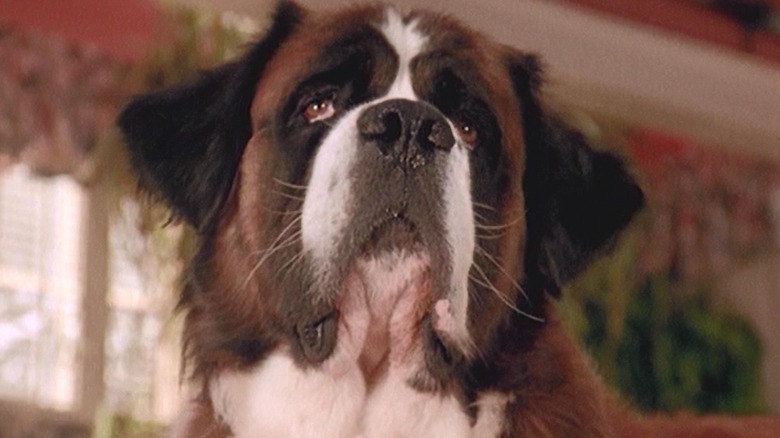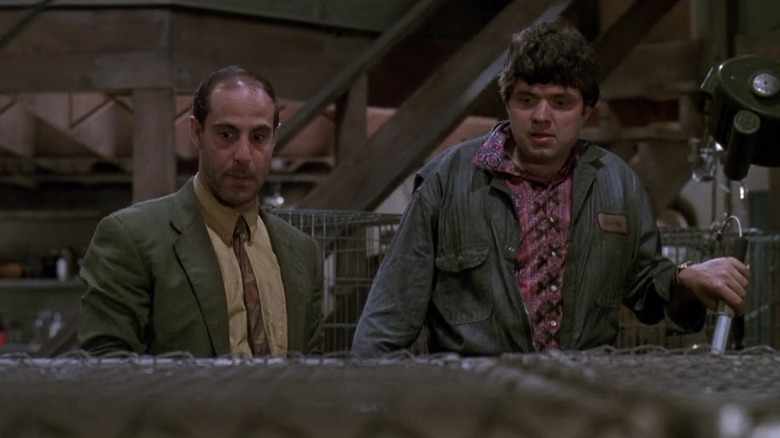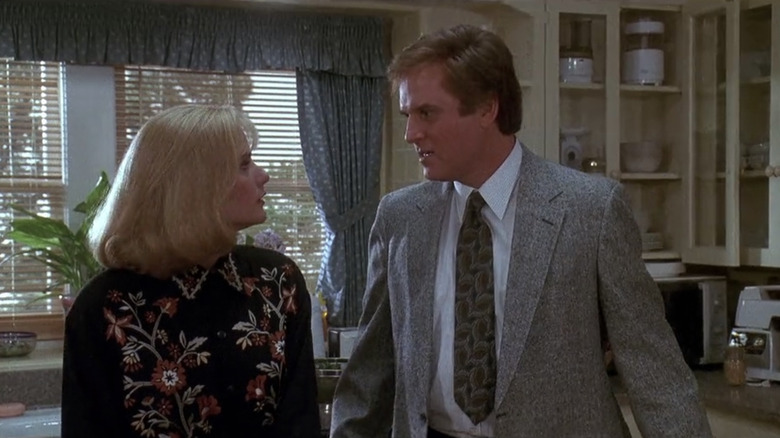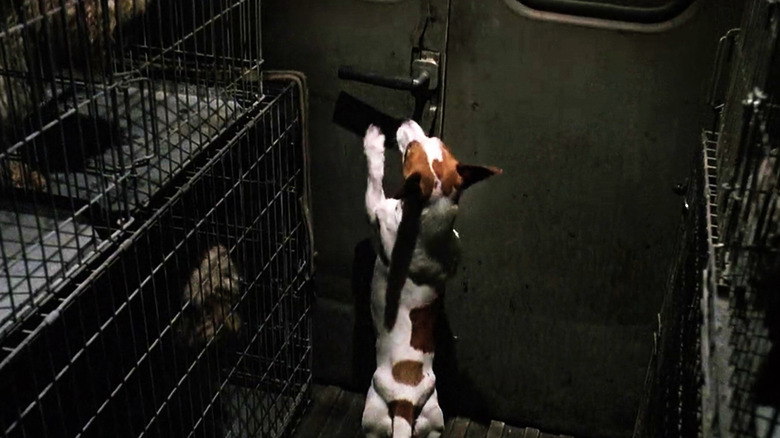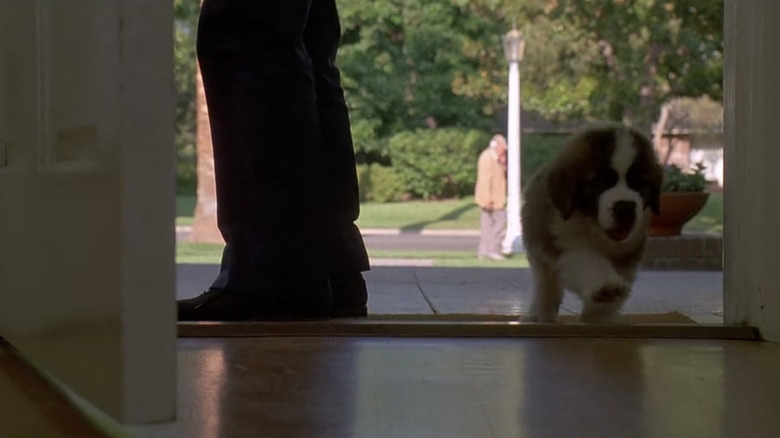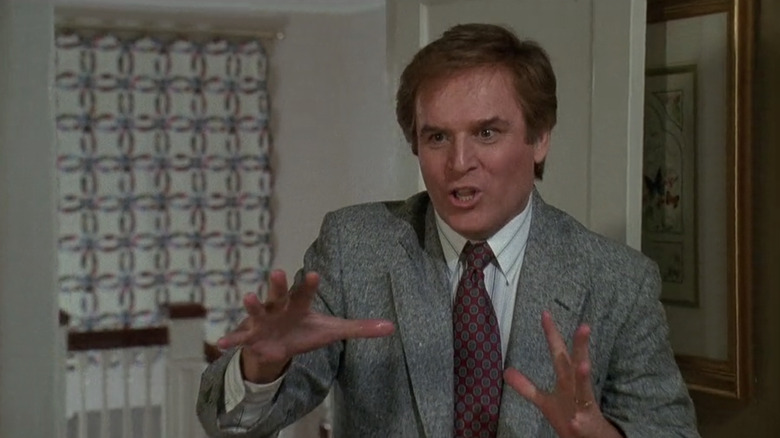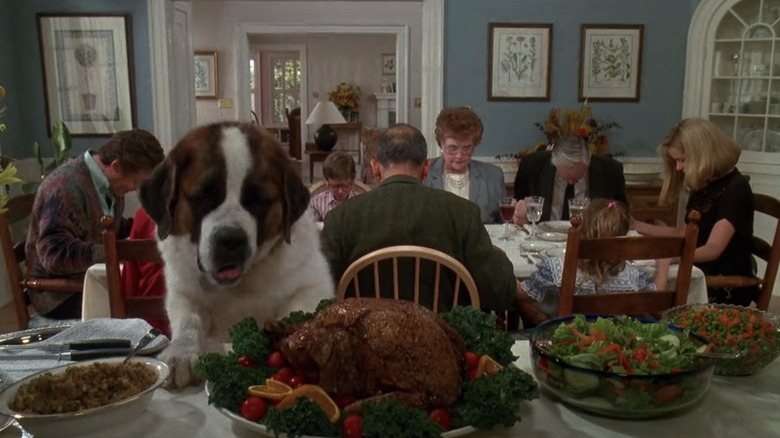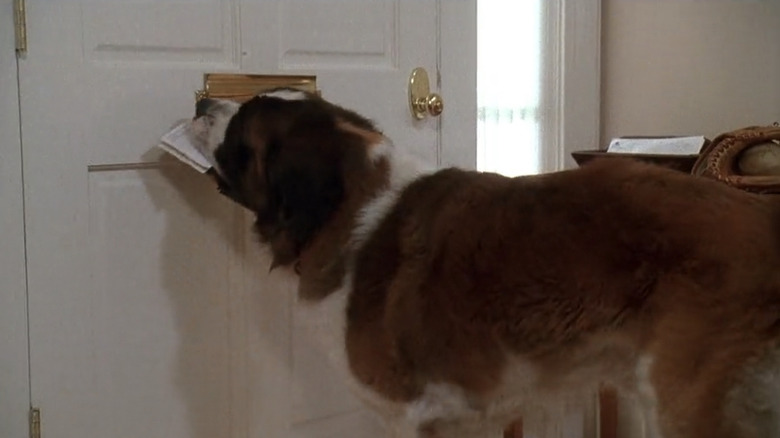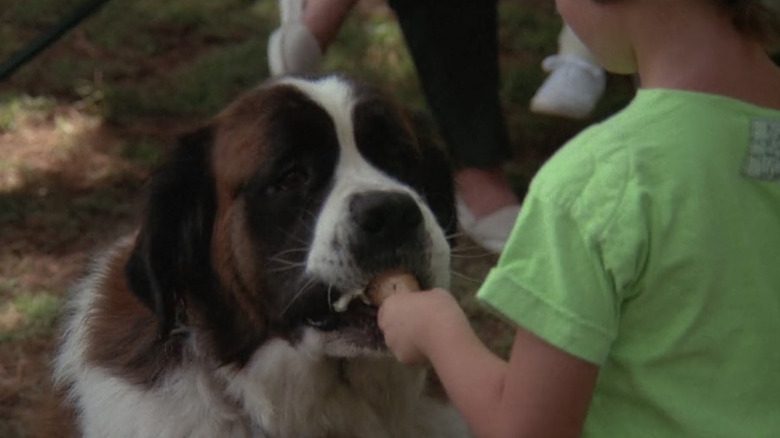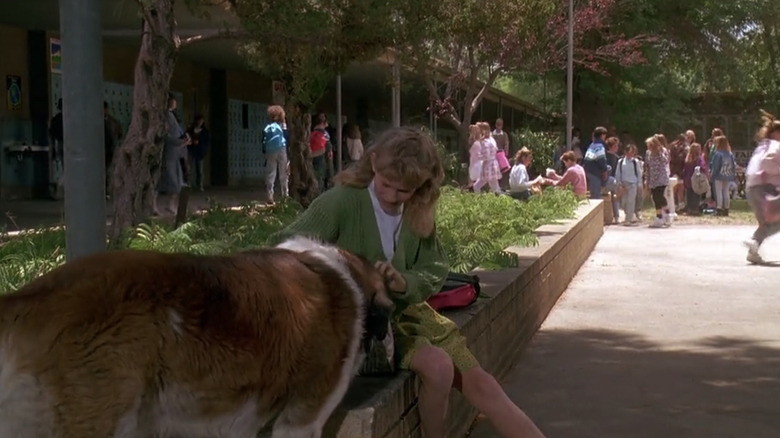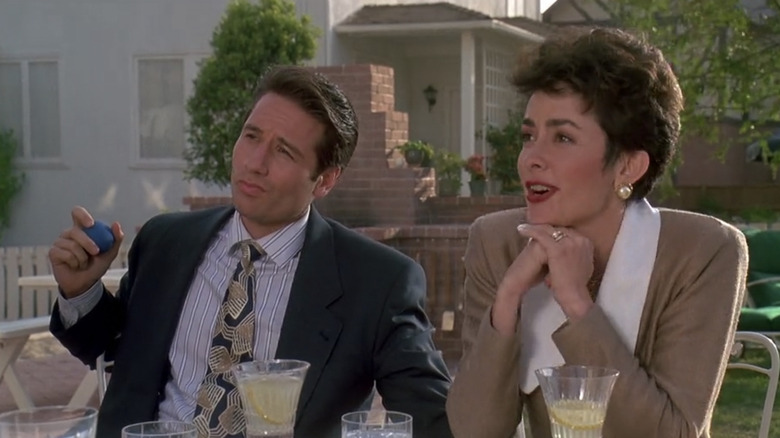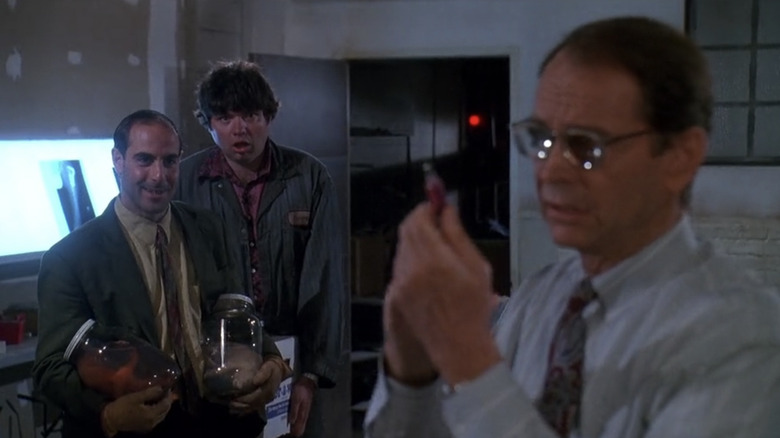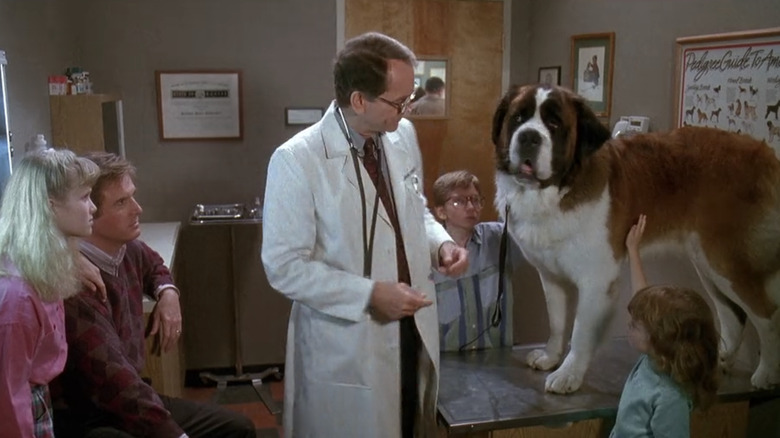Things Only Adults Notice In Beethoven
There's a wealth of cherished movies about dogs, and one common theme is that the dog in question tends to be the heart and soul of the family, the glue that's holding everyone together. The 1992 family comedy "Beethoven" is undoubtedly one such movie.
The film follows the misadventures of the titular furry, four-legged character, a pet named after the composer Ludwig van Beethoven. Beethoven enters the Newton family's life by wandering into the wide-open front door of their home and is (sort of) welcomed with open arms. Over time, Beethoven gets more and more massive, as Saint Bernard dogs do, and he also becomes a bigger and bigger part of the Newton family.
He seems to have a special relationship with each one of them, including all-business-and-no-fun George Newton (played by the late Charles Grodin). While he has good reasoning, George didn't want to keep Beethoven in the first place, but he plays a big role in saving the floppy-eared canine by the movie's end.
Though "Beethoven" is a lighthearted romp for all ages, there are plenty of elements in the film that tend to go unnoticed by younger viewers. We're here to reveal the things only the adults caught on to in this heartwarming tale of a sloppy, drooling, hungry, heroic dog.
All the cameos
Since "Beethoven" was released in the early '90s, nearly 30 years ago, there are plenty of cast members that might have gone unnoticed by younger viewers watching this movie for the first time, both at the time of its release and especially after decades elapsed. But for more seasoned viewers, it's hard not to notice the cameos.
Leading off, Stanley Tucci, who has since starred in films such as "The Devil Wears Prada" and countless others, plays a bad guy in "Beethoven." His character Vernon kidnaps dogs for a living so his boss, Dr. Herman Varnick (Dean Jones), can illegally test weapons on the poor animals. David Duchovny, who'd go on to star in hit TV series such as "The X-Files" and "Californication," plays Brad Wilson, a scheming venture capitalist, in "Beethoven." And although it's hard to spot no matter what age you might be, a young Joseph Gordon-Levitt, who has since appeared in movies like "Inception" and "500 Days of Summer," played a small role in "Beethoven" as a child.
These are just some of the actors whose appearances could easily go over the heads of younger audience members, who may not recognize that each of them has gone on to have a successful career.
The actors who played George and Alice have a remarkable age difference
The married couple in "Beethoven," consisting of George and Alice Newton (Grodin and Bonnie Hunt), might look like they're around the same age, but that certainly wasn't the case. Despite their age difference never being mentioned in the movie, Grodin and Hunt have a nearly 27-year age gap in real life. At the time of the movie, Hunt was 29, and Grodin was 56. Both actors fit into their roles perfectly, so the casting decision now seems like a no-brainer.
It's certainly not a big deal, but it's one of those things that's hard not to ponder as an adult once it's called to your attention. But if older audiences clocked it, the realization certainly didn't dampen the reception of the film: "Beethoven" would go on to make nearly $150 million worldwide and spawn many sequels. Age is just a number. And, well, Grodin rocked 56 years old.
Sparky and Beethoven somehow jump out of a moving vehicle
Although it's a pleasant surprise, shrewd viewers can't help but raise their eyebrows when Beethoven and Sparky, a stray Jack Russel Terrier, jump out of a moving vehicle unharmed. We're not trying to pick any nits here, but the fleeing scene at the beginning of the movie is a little far-fetched, clearly sprinkled with some movie magic.
After Sparky and Beethoven are stolen by Vernon and Harvey (Oliver Platt) and put into a van with other dogs, the van flees the scene and outruns the cops with ease, so it must be moving pretty fast. Sparky, a tiny dog with little leverage and, like all canines, no opposable thumbs, somehow manages to open the van door. Then, just as implausibly, the terrier and Beethoven jump out of a vehicle that's apparently moving faster than a police cruiser.
We're just as happy as anyone that they weren't harmed and escaped the dog-nappers, but this event is simply hard not to question as an adult. Ironically, despite their superhuman (or super-canine) evasive feat, both dogs are captured by the same criminals in the future. Luckily, Sparky and Beethoven get their revenge, and the dog pals escape Vernon and Harvey once more — only this time, the humans are rightfully arrested.
Beethoven's journey to his new family is absurd
In this instance, "absurd" doesn't have to be a bad thing. In case you weren't keeping track while watching this classic, Beethoven's journey to the Newton family is a roller coaster. As a puppy, he begins the movie at a pet shop. He's then stolen from the pet store and put into a van. Against all odds, Beethoven escapes the van with the help of his new terrier friend. He then hides in a trash can where he wakes up forlornly the next morning. Next, he trots into the open door of the Newton household undetected by its oblivious occupants. And all of this happens before 7:00 in the morning. We've heard of a dog choosing its owner, but this is ridiculous!
Beethoven could have walked into any home in this nice suburban neighborhood, but he scampers into the Newton residence. To a kid, his journey might just seem like a goofy montage. But as an adult, it's hard not to realize how lucky Beethoven is, how blessed the Newton family is to be found by him, and honestly, how crazy it is in general for a dog –– nay, a shrill and conspicuous puppy –– to stumble unnoticed into a home.
George's 'controlling' behavior is confusing
At the start of the movie, the audience is expected to believe that "family man" George is controlling. His wife even comments that he's quite particular and a bit authoritarian and that she and her kids have to go by his rules. George makes his family wake up at 7 in the morning on a Saturday, yet it's never fully explained why. While the Newton patriarch is portrayed as a schedule-oriented person, forcing his family to wake up at a certain time on the weekends just for the sake of waking up is, indeed, controlling. But it's hard not to wonder as a seasoned viewer why he makes his family do this. This controlling behavior isn't justified, nor is it really expanded upon.
Alice refers to George as cold and insensitive, yet he still agrees, if reluctantly, to keep Beethoven. And other than George getting mad at the dog throughout the movie –– mostly for plausible reasons, such as the usually unattended dog tearing apart the home –– George doesn't seem all that bad. If anything, he's reasonable. He does kind of pressure his wife into going back to work, but that's not the worst crime in the world. Plus, once he recognizes what she wants –– to stay at home with the kids –– he accepts it. His behavior is at worst a little inconsistent: He's certainly not perfect, but such is the nature of human beings (and dogs).
In George's defense, he makes a good point about not keeping the dog
Whether viewers believe George is micromanaging his family or not, his reasoning for not wanting to keep Beethoven is justified. Sure, telling your kids they can't keep a puppy that magically found them is apparently the ultimate transgression in a family comedy film, but George is worried that a dog of Beethoven's size will destroy the house. He also believes his kids will eventually lose interest in Beethoven –– which they kind of do –– and then he'd have to take care of a dog he didn't want to be held responsible for in the first place.
When you think about it from a busy adult's perspective, Beethoven just wanders into the house and becomes an obligation. Sure, the family posts signs around town to see if anyone claims the dog and finally opt to keep him when no one does, but that's not necessarily how this big of a decision is supposed to be made.
While the kids appear to help out after George threatens to get rid of Beethoven, it's generally George who feeds the dog, cleans up after him, comes home to untouched messes, takes him on walks, and so on. Having a dog can be a magical and life-changing event, but it comes with a lot of responsibility — a responsibility that George, despite how much he eventually comes to love Beethoven, very reasonably tries to avoid.
Beethoven's behavior is contradictory
Likely for comedic purposes, Beethoven's behavior is blatantly contradictory. For example, the dog tears apart the house one moment and then delivers his family's mail the next. Let's go over that again: He demolishes houseplants, shoes, walls, and everything in between, yet he's somehow able to carefully collect mail from a mailperson and swiftly walk it to his family (without knocking anything over) ... only to follow that good (boy) deed with another contradiction by begging for food and eating bacon off the table.
Dogs, like all pets, are perfectly imperfect, but as an older audience member, it's hard not to notice the inconsistencies in Beethoven's behavior. Then again, that's the point of Beethoven –– the dog pretty much does whatever he wants because he's smart. He has the freedom to be whatever kind of dog he desires, even if that means being well-behaved one minute and a menace the next. Beethoven is allowed to have contradicting patterns, and we don't need to question his motivations — or how he learned to deliver mail.
Beethoven eats a lot of human food
From bacon to donuts to ice cream to Twinkies to cookies, Beethoven eats a disturbing amount of human food. The occasional table scrap is probably fine, but Beethoven appears to have a near-daily routine of breaking out of his cage and running around town –– and the townspeople unfailingly give him food.
Beethoven is a really big dog, so we don't doubt he has the appetite, but dogs don't have the same digestive enzymes as humans. It's questionable how the furry animal can physically handle a buffet of Twinkies, cookies, and ice cream all in one day. Differences in digestive systems aside, the amount of sugar in some of these foods would be a recipe for disaster even in humans. As a seasoned audience member, it's hard not to wonder what the consequences of eating all this human food, and junk food at that, would be for a dog.
But in the sometimes implausible world of this family comedy, Beethoven's diet is just another element that exists purely for comedic purposes. The sweet-toothed Saint Bernard appears to be just fine –– because, you know, it's a movie.
Beethoven's whereabouts are a little disturbing
Beethoven is a special dog who seemingly knows his way around Los Angeles, which is known as a terrible place for traffic and definitely not the easiest city to navigate. Yet Beethoven seemingly escapes his backyard cage on a routine basis. He then walks around town as an everyday passerby. People wave at him like friends, and a donut shop owner gives him a pastry after he announces himself at the window.
Beethoven even ventures to Ryce Newton's (Nicholle Tom) school, and instead of being startled that Beethoven is there, Ryce nonchalantly greets the family dog. He then returns home of his own accord and fights off Ted Newton's (Christopher Castile) bullies. It's all in a day's work, really.
Although it's hard for an older viewer not to look at Beethoven's day and think his whereabouts — and the family's lack of awareness regarding them — are disturbing, one thing is for sure: This dog is self-sufficient, and his big-city life is enthralling.
George never finds out about the swindling venture capitalists
One of the most important scenes in "Beethoven" happens when George and Alice entertain venture capitalists Brad and Brie Wilson (Patricia Heaton) at their home. Brad and Brie are over-the-top financial mavericks who don't want kids, mainly because they're career-oriented. In 1992, apparently, you could choose only one or the other.
While Alice and George are inside, the Wilsons sit in the backyard and discuss how they plan on giving George's company the necessary capital it needs, but they're eventually going to come in and take the company from him. Beethoven overhears everything.
There's a lot to unpack here. First and foremost, George is a detail-oriented person, yet he's about to sign a contract without reading it simply because the Wilsons are pushy — despite this supposedly being the biggest deal of his life. Secondly, Beethoven somehow understands what they're saying and heroically foils their plot in order to save George's company. The audience is expected to accept this without questioning when Beethoven learned how to talk business.
In any case, Beethoven saves the day by ruining the barbecue and sending the Wilsons packing. But George never actually finds out that the couple planned on swindling him out of his car freshener firm. Although the audience –– and Beethoven –– are aware of this information, it's never revealed to George. He's left thinking that Beethoven ruined the most important deal of his life when, in reality, he saved his owner's bacon.
Beethoven is pretty dark for a family comedy
"Beethoven" is considered a family comedy classic. While it's an entertaining movie, it's also pretty dark for a family comedy. The villain, after all, steals dogs and tests weapons on them. Nothing screams "family movie" quite like a mad veterinarian taking advantage of his dog patients. He takes money from unsuspecting families and uses it to do unethical experiments that, to the best of the audience's knowledge, lead to some gruesome dog casualties and some brokenhearted owners.
There are, of course, a lot of heartwarming elements in "Beethoven" to balance out the evil, which is mostly implied and not pictured. Beethoven comes into the Newton family's life and brings them closer together, saving each of them in his own way. The dog seemingly spends time with each family member, never picking a favorite, and spreads his dog love to everyone in the home. Still, the premise is pretty dark, which is almost impossible to overlook when you're viewing this movie through an adult lens. Luckily, though, the full realization of the film's death and destruction probably doesn't dawn on younger viewers.
Seriously, how does the unscrupulous Dr. Varnick own a veterinary clinic?
Although owning a veterinary clinic makes it convenient for Dr. Herman Varnick to find dogs for his unethical experiments, a skeptical viewer has to ask: How does he get away with this behavior for so long? If he's not actually a veterinarian, how does his practice stay open? Surely, someone who's not professionally trained in this industry, which requires years of schooling and experience, would have some mishaps and dissatisfied customers.
It's hard to believe that pet owners continue to go to the town vet if he's constantly putting down dogs. Beethoven couldn't have been the first patient that Dr. Varnick wronged. Surely, this would lead to some rather harsh reviews, although this movie predated websites like Yelp. If Dr. Varnick isn't a veterinarian, then it's implausible for the audience to believe he can perform procedures on animals — which he must undoubtedly be expected to do on any animals he isn't taking for his experiments. And even if he did go to school to study the profession, it doesn't explain how or why people continue to go to his clinic if dogs keep dying mysteriously there.
Ultimately, "Beethoven" ends on a pleasant note for everyone but the villainous "veterinarian." The movie's messages might land differently for kids and adults, but all viewers are united in appreciating a perfectly splendid dog tale.
